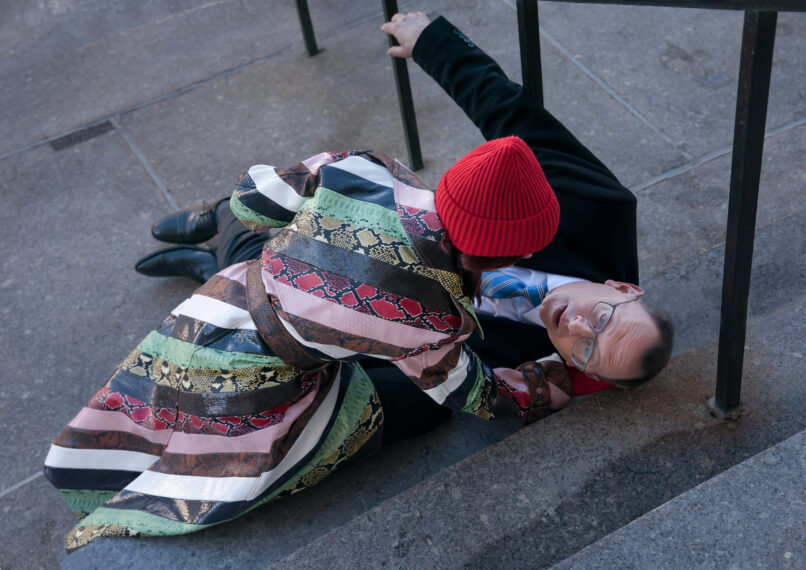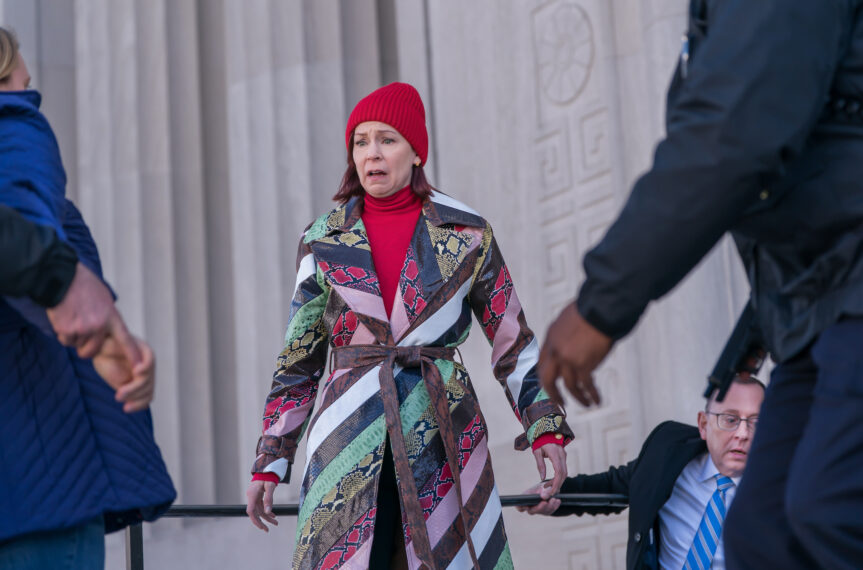[Warning: The following contains MAJOR spoilers for Elsbeth Season 2 Episode 18, “I Know What You Did Thirty-Three Summers Ago.”]
Well, there goes any chance of Michael Emerson returning in Elsbeth Season 3. The Lost and Evil alum’s villain arc came to a “biblical” conclusion, as Emerson describes it to TV Insider, in the Thursday, April 24, episode, and his ending is as memorable as it is classically dramatic. It also guarantees that Judge Milton Crawford can’t return unless in flashbacks.
The episode revealed Crawford’s backstory, and as previewed by Emerson before the episode came out, young Milton was just as murderous as his older self. He’s a “sociopath,” Emerson told TV Insider, one who killed a teenage girl when he was a teen because she rejected his sexual advances. The only other person involved in that bloody night at their country club pool was none other than Andy, the man viewers saw Crawford murder in his debut episode of Season 2 (Episode 7, “One Angry Woman”). With a seat on the Supreme Court on the line, Crawford killed Andy and framed Andy’s lover, Delia Kirby (Meredith Holzman), to make sure that the skeletons of his past couldn’t come back to haunt him. He would have succeeded if it weren’t for one Elsbeth Tascioni (Carrie Preston, Emerson’s real-life wife).
Elsbeth and Captain Wagner (Wendell Pierce) investigated this suspicious death in Crawford’s past in the episode, and the judge caught wise to their schemes. He seemingly bested them after he clocked their attempt to gather a DNA sample. Crawford was so confident he had won and that a seat on the nation’s highest court was his, he basically confessed his murderous deeds to Elsbeth on the steps of the Manhattan courthouse. Thunder struck as he insidiously declared himself too “mighty” to defeat, but he spoke too soon. While Elsbeth’s investigation continued to fail, making her legitimately consider letting him win to protect others from further harm at the judge’s hand, Delia took matters into her own hands.
No sooner had Crawford finished roaring his praises did Delia arrive on the steps of the courthouse with a gun in hand. She shot Crawford right in the heart. As he collapsed on the stone steps, Elsbeth reacted in horror and said “there’s hope” as she cried — a shocking reaction for someone who has believed Crawford to be evil for so long, but for Elsbeth, this isn’t justice. And now the formerly innocent Delia really has committed murder, with scores of witnesses including law enforcement to boot, all but ensuring a lengthy prison sentence for her.
Michael Emerson says that Crawford’s death marks a return to form for the CBS series, but his downfall at Delia’s hand will still reverberate throughout the rest of the season that concludes on Thursday, May 8. Take a deep dive into Emerson’s final episode of Elsbeth below and see how he and Preston feel about their latest costarring adventure.
Did you know from the beginning when signing on for this role when Crawford would meet his end?
Michael Emerson: I never expected it to go on for very long, but they liked the character. They liked the tension between Elsbeth and the judge. And so I ended up being in more than I had expected, but I did not expect it to go forever. I didn’t expect to become a regular character on the show, like an ongoing Moriarty to Sherlock Holmes. I thought the amount of time I spent, the character I developed, the scenes we played, I thought they felt like about the right amount to me, like a perfect meal in a way. And I was happy with the way things worked out. And it’s a good, shocking surprise ending, I think.
Michael Parmelee / CBS
Some of Elsbeth and Crawford’s first scenes occur on the same steps where Crawford is killed right in front of her. Unpack the meaning of that parallel.
Those steps are iconic. All great courthouses seem to have a mountain of steps before them. It is because the law, our sense of justice is an elevated thing. It’s high on a hill. It is above the every day, and those steps are also a kind of a ladder, if you will, a ladder to power or vindication or validation. So it’s a good metaphor, and it’s important how they stand on those steps and the things that happen on those steps. Truths are told, confessions possibly. Things are crowed about. It’s good. It gave me a lot to play in this last episode. For him, I thought, oh, this is the best day of his life. He has won on all fronts. He’s just enjoying himself. He feels so untouchable that he can, for all intents and purposes, confess to her.
You know what they say, pride goeth before the fall. So he maybe should have seen this twist coming.
Well he, the predator would never dream of himself as prey.
Right. And the staging of some of the scenes on the steps was very interesting. There are moments where Elsbeth was below Crawford on the steps, and then in this finale, they’re equal in these final moments, which is a lot of visual storytelling there. Crawford calls himself mighty as thunder strikes above him in this final closeup just before he’s shot and killed. It’s very, oh, how the mighty have fallen, pride goeth before the fall. Do you think Crawford’s villainy is informed by something innately evil within him, or his life of wealth and privilege and unchecked power? Maybe all of that?
It seems like just a blending of a natural, cultural sense of entitlement of his family history and his education placing him maybe slightly above the conventional laws of everyday humans. But I think there’s also something — I think he’s a sociopath. I think there’s something missing in him. He has, let’s call it anger or violence in him, and he’s covered it well his whole life.
The flashback certainly seems to paint that picture, too, that there’s something up with this guy, something unsettling. Something that was probably more shocking than Crawford being shot was Elsbeth saying “there’s hope” to him after he was shot in the chest. How did that make Crawford feel?
He can’t even hear her at that point. He still is trying to absorb the enormity of the unthinkable idea that his victory is not for keeps. Probably his last word, if he could get one out, would be to justify himself or to say, “This can’t happen. This is not how this works. This is the wrong story. This is not the end.”
It’s so quick and shocking. And he had just gone on a diatribe about how he’s so unbeatable. Spoke too soon. What do you think that says about Elsbeth as a person, that she’s trying to comfort this person she’s been trying to take down?
He’s a dead man or a dying man looking in her eyes, and she’s the same tenderhearted human that she always is. A thing he could never understand.
If only he had more of his wits about him in that final moment to really think about the depths of that.
He hasn’t even time to reflect. There is no time for repentance or redemption. He’s done.

Michael Parmelee / CBS
Elsbeth doesn’t see Crawford’s death as justice, but is it satisfying karma?
Well, that’s the point of discussion that people will take away from this episode is where manmade justice cannot win, when manmade justice has the right but can’t prevail, are there other kinds of justice that we will accept?
And what is your take on that dilemma?
I think it’s a great ending. It’s Greek. It is the job of the fates, of the gods. It’s biblical.
Very much so. Especially with him saying, “I am mighty,” and thunder striking.
It’s pretty good, right? I saw those lines and I thought, wow, I’ve never played a character that would say out loud to another person that they were mighty. But he believes it in that moment. It’s a like mental illness.
Pretty much the definition of famous last words.
Yeah, right? Beautiful. It was so good. Nice piece of writing, I have to say.
It’s delicious. And I love the voice that you’ve given Crawford, too. It has an elevated melodrama to it that just really heightens the character.
Thank you, thank you. I gave a lot of thought [to Crawford’s voice]. I learned in graduate school, every character you play has a body of their own and a voice of their own. And I worked to find a voice that I felt was him, not me, and that told a story about him, his upbringing, his sense of his place in the world. I pitched a little more of a head voice, a little more formal diction, a little more Ivy League, a little bit of that. But then you don’t want to do too much with it.
Could you tell, even without knowing how his story would end, that there was a biblical, ancient Greek storyline bubbling within him? And that’s what informed the voice?
Yes, yes, because he is a creature. His downfall would be obvious to a Greek theater goer because he has hubris. Because he does not acknowledge of any power above himself, and that’s a ticket to the end in really all ancient storytelling forms, whether it’s Biblical or Greek or Roman. So it’s good, and I tend to try to think about the characters I play, if it’s allowed, in those terms — to think that the stakes are always higher than we think.

Michael Parmelee / CBS
Was his death the last scene that you filmed?
Oh, good question. I think maybe it was.
How perfect. I know that TV is very often, almost like by design, not filmed linearly.
Right, it rarely is.
As you filmed your final scene, you’re obviously feeling Crawford’s feelings, but underneath all of that, what was husband Michael thinking as this job with Carrie came to an end?
I was thinking, this has gone very well. This is playing out well. We were ready for writing this strong, and when we got it, we could play it.
It’s been so delicious watching you two as foils for each other this season. Now that it has come to an end, what are some reflections on your time on Elsbeth? What will you remember the most?
I’ll remember it as a happy experience, one that terrified me a bit at the beginning to be thrown into a big role, a leading role without having time to work it up, to just kind of hit the ground running and hope that I find character while I’m running. But I did. I had enough episodes to settle down into it and get confident and comfortable inside the skin of this character to have found this character’s voice and this character’s attitudes, this character’s sense of humor. All of that makes me way more comfortable. And then I begin to have more fun.
Will his assassination get Elizabeth in legal trouble? Because this description for next week’s episode says that legal trouble is on the way for her. I wonder if Crawford is at all tied to that?
He had set certain processes in motion, but I think without him there personally to wrangle those processes, that stuff’s going to fall away. The show finds its lightheartedness again.
Elsbeth, Thursdays, 9/8c, CBS
This story originally appeared on TV Insider

